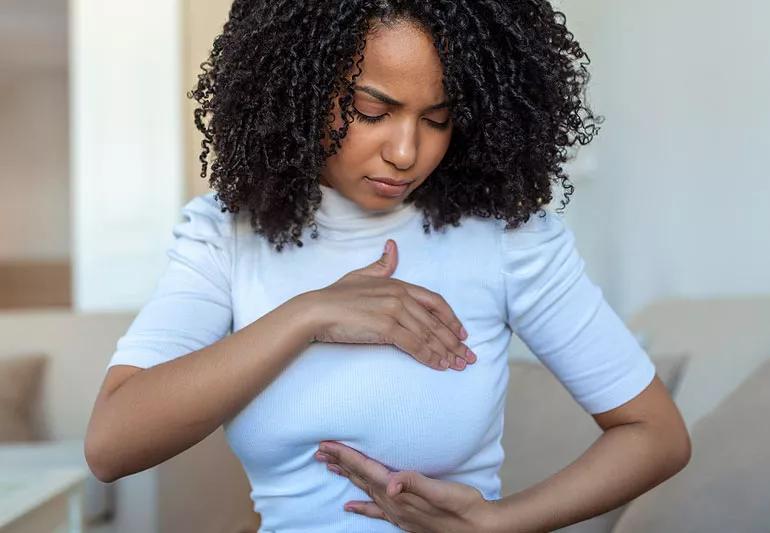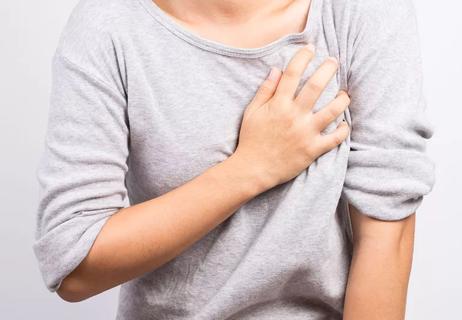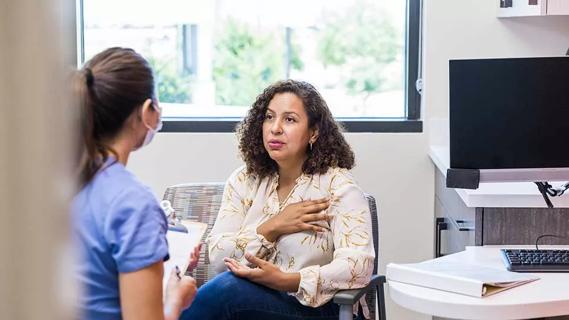Any mass or abnormal area that you feel for more than three days should be checked out

If you find a lump in your breast, what should you do?
Advertisement
Cleveland Clinic is a non-profit academic medical center. Advertising on our site helps support our mission. We do not endorse non-Cleveland Clinic products or services. Policy
Healthcare providers view a new breast lump, or a “breast mass” as abnormal, so the best thing to do is get it checked out.
“I always tell my patients, ‘If you feel a mass or abnormal area in your breast that is consistent for more than three days, you should get the mass checked.’ This should also include getting updated breast imaging,” says surgical breast oncologist, Stephanie Valente, DO. “You don’t want to put something off if it actually is something abnormal. So, anything that you didn’t feel there before needs to be checked out.”
When you feel a lump in your breast, it’s easy to let your mind go to the worst-case scenario — cancer. But in most cases, breast lumps are benign, or noncancerous. They can be the result of changes in breast tissue fibers. Some breast lumps are cysts or fluid-filled sacs in the breast. They’re common for women in their 30s and 40s but can form at any age — especially before periods.
According to the American Cancer Society, breast lumps or cysts don’t necessarily mean that you’ll develop breast cancer down the road.
Men can experience breast lumps (and breast cancer) as well. The breast can become enlarged and sometimes tender due to a condition known as gynecomastia. These lumps might be caused by a hormonal imbalance or a side effect of medication.
Advertisement
And a lump could even mean that you have a clogged milk duct. You don’t have to be breastfeeding to experience this condition and it can happen to all people. It’s known as mastitis and is caused by breast implants, an autoimmune disease, eczema, nipple piercing or tobacco use.
Although most lumps aren’t cancer, you can’t determine if a lump is something to be worried about just by feeling it. Any new lump, no matter your sex, needs a mammogram or ultrasound to see what it looks like on the inside.
Breast lumps can feel pretty firm or hard and they don’t have a specific shape. They might be attached to the breast tissue or they could move around slightly. Breast lumps can be as small as a pea or much larger. And if you have a lump known as a “fibroadenoma,” this noncancerous type of breast lump tends to be smooth and rubbery.
Noncancerous breast lumps might be:
They can also get smaller as time passes.
With breast cancer, not everyone will experience symptoms. If you do experience them, they could be much different from someone else’s. With that being said, some of the warning signs of breast cancer include:
Video content: This video is available to watch online.
View video online (https://cdnapisec.kaltura.com/p/2207941/sp/220794100/playManifest/entryId/1_laykbcij/flavorId/1_5f3sgelj/format/url/protocol/https/a.mp4)
Common signs of breast cancer and what to look for.
“Any changes in your skin or skin color, any lump or bump that’s different needs to be evaluated, even if you had an updated annual mammogram recently,” stresses Dr. Valente. This also includes changes in the nipple, especially if it becomes inverted or has discharge.
Typical breast lumps are:
So, if you notice a breast lump, contact your provider right away. They can use radiology tests to rule out cancer and the sooner this is done, the better. If it is breast cancer, treatment will be more successful if it’s started early. “It’s always better to be safe than sorry,” Dr. Valente says.
Advertisement

Sign up for our Health Essentials emails for expert guidance on nutrition, fitness, sleep, skin care and more.
Learn more about our editorial process.
Advertisement

Dry skin, eczema, allergies and infections can all cause itchiness — but in some cases, itching may signify a more serious health condition

A breast abscess feels like a hot, hard and painful lump — seek support from a healthcare provider at first signs of an infection

Bacterial infections, breast abscesses and clogged milk ducts can all cause inflammation in your breasts

How to separate serious concerns from minor pain

A second appointment is common, especially after your first mammogram and if you have dense breasts — but it doesn’t necessarily mean anything is wrong

Hormone changes may lead to sore breasts, but lifestyle changes can help

Not all rainbows have gold at the end — the ones our bodies produce offer insight into our health

Act quickly by locating the object, gently removing the debris and flushing your eye

Even small moments of time outdoors can help reduce stress, boost mood and restore a sense of calm

A correct prescription helps your eyes see clearly — but as natural changes occur, you may need stronger or different eyeglasses

Both are medical emergencies, but they are very distinct events with different causes